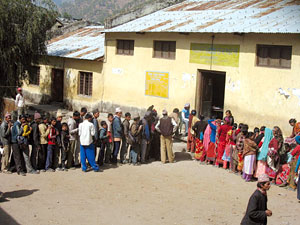 MOHAN MAINALI |
Soldiers that used to rudely interrogate villagers are now seen chatting and giving newcomers directions. The Maoists who used to regard all visitors with suspicion and extort money from shopkeepers, now leave the people alone.
Jasi Ram Sahani, a shopkeeper at Bajura's airfield at Kolti, got it from both sides: the army detained him for two days for selling banned items like batteries and kerosene. And he often pretended to be sick when Maoists came around to force villagers to attend their meetings.
"The stress was unbearable, I used to be terrorised when I saw anyone with a gun," Sahani recalls. He suffered psychological trauma and went to India for treatment, returning only after the ceasefire in 2006.
 |
"We are planning to make our college the best in Far Western Nepal," says Bir Bahadur Katawal, chief of Bajura Campus in the district capital of Martadi. The college was set up with support from the district administration and donations from individuals. Teachers contributed by working almost voluntarily.
The army had occupied a strategically-located school, and has now returned it to the community and even contributed teaching materials. Locals have helped build classrooms and toilets. Peacewin, a Bajura-based group, has been on a school and healthpost-building spree setting up 173 new classrooms in the past two years.
 |
Road connectivity has also improved, with Martadi only a half-day walk from the road. But the cargo traffic is still one way: the tractors and mule trains only bring goods up to the town, Bajura has nothing to sell to the outside world.
And although schools and healthposts have been built, teachers and health assistants are usually absent. The healthpost in Pandusen has eight staff members, but there are only two health workers taking care of 60 patients a day.
Still, for people like Shahani, the greatest change is the gift of peace. He says: "Life is safe now, I don't wish it even on my enemy to have to go through what I went through."
"Killed by hunger..."
 PRAKASH SHAH |
By 8AM two weeks ago, the streets of Kolti were already humming with activity. Sunday is when the Nepal Food Corporation sells subsidised rice. People from far and wide began to gather at the depot, empty sacks in hand.
Food distribution begins at 10AM, and an unruly queue becomes chaotic. The police move in to restore some order, but such is the desperation that they have a difficult time.
Villagers have to produce their citizenship certificate before they can buy 20 kg of rice. Chandra Jit Thapa needs to make a three-day roundtrip from Bichhya village just to get the rice, and he gets a double quota because he is from a far flung village.
"As a rule an individual can buy 10kg of rice a week," says Mekh Raj Ojha of NFC, Bajura. Last year the NFC distributed 1,700 tonne of rice in Bajura. This year it is not going to be enough.
The unprecedented drought this year has affected grain supply, with the winter wheat and barley devastated by the lack of rain. The smarter farmers who had planted potato have something to eat. The people of Bajura have coped with it in the traditional way and the only way they know how: migrating to India for work.
"Snow in winter means a bountiful harvest, and we used to get three snowfalls a year. This year there was very little snow, so there is no food," explains farmer Hundi Rawat of Angaupani.
The surrounding mountains have a dusting of snow, but there used to be three feet of snow there in winter. There wasn't much rain in the valleys either, and even the apple orchards have suffered.
Says Rawat with resignation in his voice: "During the war, we could be killed by a bullet. In peace time we can be killed by hunger."
Mohan Mainali in Bajura


